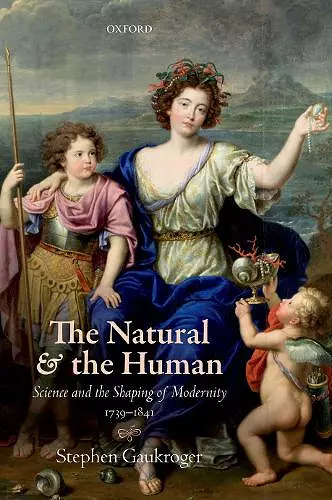The Natural and the Human
Science and the Shaping of Modernity, 1739-1841
Format:Paperback
Publisher:Oxford University Press
Published:8th Mar '18
Currently unavailable, and unfortunately no date known when it will be back

Stephen Gaukroger presents an original account of the development of empirical science and the understanding of human behaviour from the mid-eighteenth century. Since the seventeenth century, science in the west has undergone a unique form of cumulative development in which it has been consolidated through integration into and shaping of a culture. But in the eighteenth century, science was cut loose from the legitimating culture in which it had had a public rationale as a fruitful
In the first volume of his series to date (whose publication has spanned the decade 2006 to 2016), the author studied the period from 1210 to 1685, The Emergence of a Scientific Culture. His second volume overlapped the first, covering 1680 to 1760, The Collapse of Mechanism and the Rise of Sensibility. Together, these three books represent one of the landmark achievements in the field of history of science, and represent essential reading for a wide range of disciplines. A tremendous intellectual achievement. We all eagerly await the fourth volume, dealing with science and civilisation from about 1840 to 1940. * Clifford Cunningham, Sun News Miami *
The Natural and the Human...presents a fascinating, astonishingly broad-based...overview of the emergence of the human sciences, which contributes to large discussions about Western culture. * R.J.W. Mills, 1650-1850 *
The scope of Gaukroger's project is immense. His scholarship draws on primary sources in at least four languages, and extensive secondary commentary, much of it recent. Gaukroger typically proceeds by a focus on a few key individuals and their works as central nodes in developing this story--Descartes, Newton, Leibniz, Locke, Hume, Diderot, Gibbon, Mandeville, Herder, Kant, Hegel, Strauss, Feuerbach--around which he weaves a larger narrative The copious footnotes (yes, footnotes, not annoying endnotes), typically citing the most recent scholarship and the key primary sources relevant to the discussion, direct the reader to more detailed studies which he has synthesized in depth I find it deeply refreshing to read the effort of a single individual with wide and deep scholarly learning to deal with such a complex array of issues from a coherent organizing perspective. * Phillip R. Sloan, Notre Dame Philosophical Reviews *
ISBN: 9780198801603
Dimensions: 235mm x 157mm x 23mm
Weight: 628g
416 pages